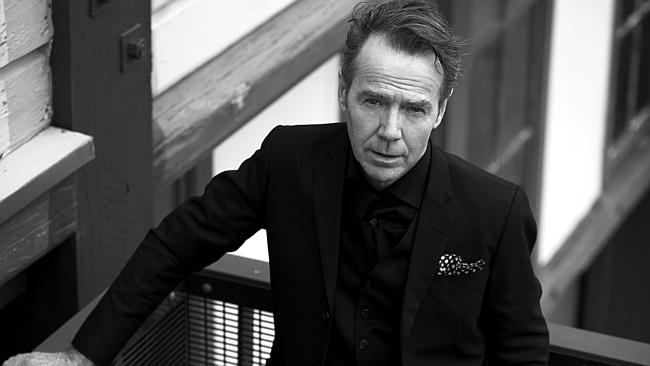From Go-Betweens to going his own way

Ex-Go-Betweens’ Peter Milton Walsh is a singular talent from Brisbane.
Source: Supplied
THIS week’s album reviews from The Courier-Mail (ratings out of five stars):
ROCK
The Apartments, No Song, No Spell, No Madrigal
(Microcultures) *****
Don’t call The Apartments the great “lost’’ Brisbane band. The music has always been there, although admittedly there were many years when you had to know where to look.
Even this album will be released first in France, where the band has had most success, with no Australian distributor as yet. But most of The Apartments’ catalogue, including this album, is easy to find now.
If you care about quality songwriting, from one of the most singular talents to emerge from Brisbane in Peter Milton Walsh, you really should explore those albums. There are no easy comparisons for the music, which is how it should be for a band of lasting worth, although it is work that sits well with Australian contemporaries The Go-Betweens, Ed Kuepper and Dave Graney.
Sometimes when I’m listening — I am often driving around alone when I listen to The Apartments, it’s that kind of music — I think of Jimmy Webb, out there on the highway in the American mid-West, the telephone wires stretching into the distance, the lineman seen working high above. The rich details from life that punctuate the drama and emotion of a great Webb tune are also to be found in Walsh’s songs.
At other times the piano chords and strings take the listener to LA and the hits of Bacharach and David.
As I say, not easy to describe: songs that are melodic and ageless; songs with tension and layers, like a city first glimpsed through the fog, then revealed, the river glinting in the morning sun.
Twenty One by The Apartments from The Apartments on Vimeo.
Walsh was, briefly, a member of The Go-Betweens, but the strength of his songs soon demanded he go his own way. The Return of the Hypnotist EP, released in 1979, is a treasure from an exciting time in Brisbane music.
A series of top-shelf albums followed: The Evening Visits in 1985, a brace of them in the ’90s. Then silence, until a new line-up of the band emerged for shows in Australia and Europe in the mid-2000s. A single, Black Ribbons, was released in 2011, and in 2013 an EP of live material, Seven Songs.
Personal tragedy stilled Walsh’s career: he and his wife lost their three-year-old son Riley to a serious illness in 1999. What does music matter after that?
But a songwriter, of course, is wired to create. Some of the songs Walsh wrote he could never sing in public. Some of them he finally can and they appear here. It is that detail from life, the truth, that often punches the listener in the chest, the guts.
Loss courses through these songs like blood through the veins. A song called Swap Places. The extraordinary Twenty One (“I’ve been stuck in the same quicksand since 1999’’) with all the imaginings the grieving parent never leaves behind, the birthday parties and balloons. It is the most beautiful song, and most moving performance of a song, I’ve heard in years.
Here Walsh works with producer Wayne Connolly and a cast in complete empathy with the material: the music runs as deep as the lyrics.
The strong, insistent pulse of the title tune, as if you can hear your heart beating on a solitary walk with “the flowers of regret so suddenly in bloom’’. The aching cello and piano of Looking For Another Town; the trumpet and strings of Black Ribbons; the descending chords of The House That We Once Lived In; the unexpected burst of sun that shoots through September Skies.
Just eight songs, less than 40 minutes of music. But what songs. It’s perfect just as it is.
The album is available from iTunes and import record shops.
Noel Mengel
ELECTRONIC
The Airborne Toxic Event, Dope Machines
(Epic/Sony) ***1/2
Like U2, Regurgitator and other experimental rockers, British indie outfit The Airborne Toxic Event have decided the best way to make a statement is with a radical electronic synth-based departure from their norm. But despite the band name, this album doesn’t sound like a fart, as U2’s recent album was described. It retains their melodies, harmonies and rock hooks while recalling some new-wave acts of the ’80s such as Depeche Mode and Ultravox. Maybe it’s frontman Mikel Jollett’s Jakob Dylan-like vocals, but TATE also sound like they could pass for The Wallflowers when not behind a wall of synth. Highlights include yet another song to sport the moniker California and
the anthemic Time to Be a Man
. Hell and Back, with its na-na-na harmonies, starts out stripped back before the inevitable synth is layered in, while One Time Thing is the tortured tale of unrequited love after a one-night stand. There’s nothing wrong with doing what you do well, but TATE have proved willing to step outside their core competency.
John O’Brien
ROOTS
Darren Hanlon, Where Did You Come From?
(Flippin Yeah) ****
There’s troubadours, the ones who go from airport to gig, hotel and out again. And there’s the real deal like one-time Gympie lad Darren Hanlon, who leaves no back road, bus trip or chance meeting unturned in the search for material for his tunes. Even a bloke who tried to break into a car Hanlon was sitting in wound up playing bass on a track. Hanlon’s odyssey for this fifth solo album took him across the American south, from Nashville to New Orleans, with unexpected delights like playing with soul session legends David Hood and Spooner Oldham at Fame Studios. Hanlon’s adventures deliver two solid-gold classics. One is a ballad, Letter From An Australian Mining Town, capturing the melancholy so many Aussies live with in the battle for a crust. Bouncing along like a Johnny Cash tune from the ‘50s is The Chattanooga Shoot Shoot, the true story of a close call with a gunman out on the highway in the US. Telling yarns, it’s what we do. On the long, dusty road that leads from Banjo to Slim to Courtney Barnett, that’s where you find Darren Hanlon.
Noel Mengel
ROCK
Blur, The Magic Whip
(Parlophone/Warner) ***1/2
Comebacks can be gruesome; releasing an album after a 12-year break even more so. But if this were a new band would people be excited? Yes. There is the Bowie-ish (circa Scary Monsters) off-planet ramble of Thought I Was A Spaceman; the lingering, lovely melody of My Terracotta Heart. The woozy slow-mo of New World Towers might have turned up on Damon Albarn’s Everyday Robots solo set. I imagine much of this playing in some high-rise apartment of the future, fitting in with Graham Coxon’s “sci-fi folk’’ description. Parts sound comfortingly familiar: the Bowie/Syd Barrett delivery of Lonesome Street
. The addition of Coxon (conspicuously missing from previous outing Think Tank
) brings the pot to boiling. Coxon and Albarn never stopped creating and exploring in post-Blur careers. Together they squeeze out some sparks perhaps not even they suspected would happen.
The Magic Whip doesn’t sport an obvious hit, or need one. Definitely the kind of record you can keep playing though.
Noel Mengel
CHORAL
Libera, Angels Sing Libera in America
(Warner Classics) ****
Choral music is alive and well if this Libera disc is an indication, one of many released by major labels of late. Springing from English boy choristers’ (“angelic’’) tradition, Libera from south London reaches new artistic dimensions in these spiritual works recorded live on tour at the Basilica of the National Shrine of the Immaculate Conception, Washington DC. Choral purists may scorn American influences here, bright, expansive choral sounds in pop-style orchestral surrounds. For them some music is “sacred”, and Joyful, joyful, we adore thee from Beethoven’s Ninth Symphony Ode to Joy adapted by Henry Van Dyke (words) and Robert Prizeman (music director for the project) may be one such “untouchable”. Yet it opens a thrilling program of shimmering harmonies, voices soaring through Morning has Broken, Amazing Grace, Be Still My Soul alongside Prizeman’s arrangements of Schubert’s Ave Maria, Voca me (from Pergolesi with a Hildegard von Bingen fragment — heavenly to the max), How Can I Keep From Singing? plus others including the patriotic America the Beautiful.
Patricia Kelly
SOUL
Boz Scaggs, A Fool to Care
(429 Records) *****
This is part two of a mooted southern soul trilogy that began with 2013’s outstanding Memphis album, and it’s every bit as good. Once more drawing on Americana from the golden triangle states of Texas, Louisiana and Oklahoma, A Fool To Care also reunites Scaggs’ core band of Ray Parker Jr (guitar), Jim Cox (keys), Willie Weeks on bass and drummer Steve Jordan, who again produces. Adding wisps of pedal steel to an ominous There’s a Storm A-Comin’ and murmuring accordion on a handful of other similarly obscure yet well-chosen covers, the band also heads south of the border on the Latin-tinged Last Tango on 16th Street and I Want To See You, both of which slink like vintage Willy DeVille. Elsewhere, Scaggs revisits the soul-pop fusion of his ’70s breakthrough album, Silk Degrees, with lip service to Al Green and Curtis Mayfield. There are also two stunning duets — Bonnie Raitt sizzles on the upbeat Hell To Pay (the album’s token original), while Lucinda Williams adds her distinctive tipsy timbre to a reverent reading of The Band’s Whispering Pines. Bring on part three.
Phil Stafford
ROCK
Surf City, Jekyll Island
(Popfrenzy) ****
Auckland’s Surf City have been riding the crest of the psychedelic/space-rock revival for a few years now and with Jekyll Island the band seem set to attract a new wave of fans. On opener Beat the Summer Heat, singer-guitarist Davin Stoddard has more than a hint of Brian Wilson in his vocals, complemented by laid-back percussion and Eastern-influenced guitars. Spec City is more straightforward, with its “there’s no way of getting out of here alive” refrain providing one of the album’s most infectious hooks. Jekyll Islandand the Psycosphere traverses more out-there terrain, underpinned by Ray Manzarek-esque keyboards, and Hollow Veins is another standout, with rudimentary instrumentation and an off-kilter chorus. Throughout the 11 tracks, there are a range of other influences bubbling just beneath the surface, with hints of Sonic Youth, Pavement and Flying Nun Records acts such as The Clean evident, but all blended together and delivered with a decidedly indie-rock flavour. Other highlights include
Leave Your Worries and the chilled-out Indian Summer but none of the tracks outstay their welcome.
Daniel Johnson









